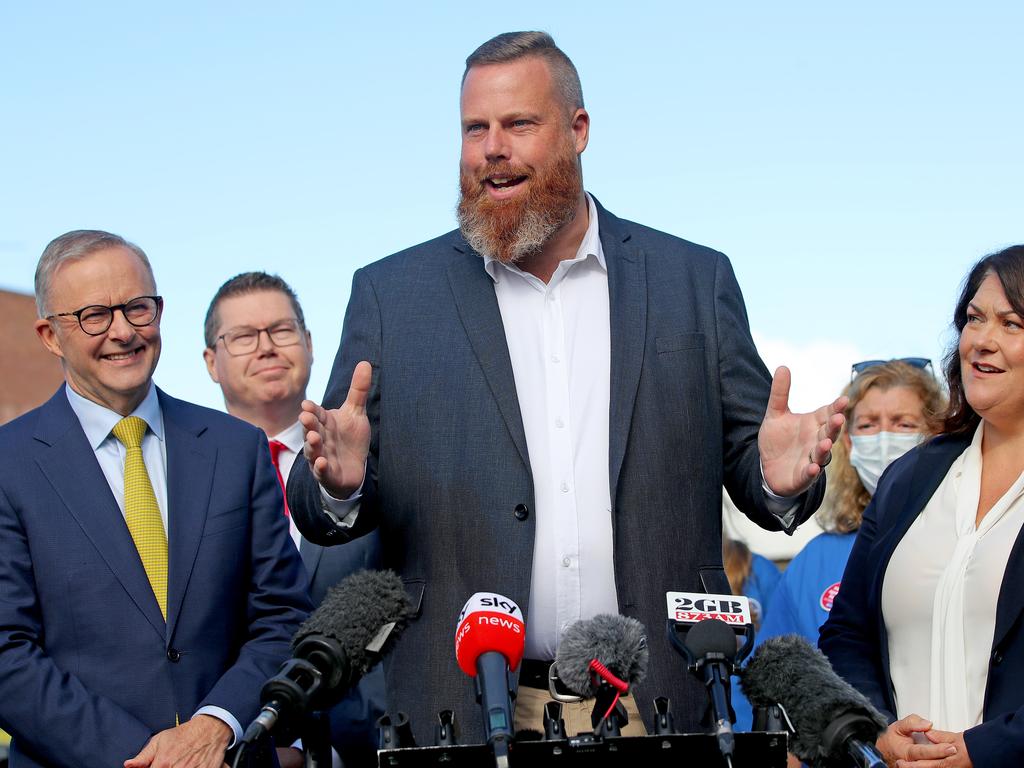Public service’s ‘dirt job’ for Jim Chalmers
Treasury officials advised Jim Chalmers that its $10bn costings of the Coalition’s small business tax policy were highly unreliable, according to an internal email chain.

Treasury officials advised Jim Chalmers that its $10bn costings of the Coalition’s small business tax policy were highly unreliable, according to an internal email chain that also reveals it had used social media posts from almost a decade ago for the basis of some its assumptions.
A series of exchanges between senior Treasury officials and the Treasurer’s office, also reveal that Treasury was aware that it was modelling Coalition policy, despite assurances from Treasury secretary Steven Kennedy to the opposition that the department had not been politicised.
The correspondence emerged as the public service came under fire over the discovery of union propaganda critical of Peter Dutton in a departmental office.
The emails between Treasury officials and the Treasurer’s office have been released under a Senate Order for the Production of Documents following a protest from opposition Treasury spokesman Angus Taylor that Dr Chalmers had used Treasury as a political “dirt unit” before the election.
Treasury is prohibited from costing opposition policies on behalf of the government of the day.
In one email, dated February 3, between two Treasury officials and copied to others, including several whose names were redacted, the definition of meal and entertainment expenses was discussed.
Dr Chalmers’ office asked Treasury to cost a policy based on the opposition’s proposed tax changes to allow small businesses to claim up to $20,000 a year for meals with staff or clients.
“Ultimately, this is one where the devil really would be in the detail of any policy/law change,” the email said.
“The Coalition’s media release of 19 January (tax deduction to deliver red tape relief for small business) includes the following paragraph: ‘Shadow Treasurer Angus Taylor said the new deduction would apply to meal and entertainment expenses that have a connection with business activity and income including dining and entertainment provided to clients, vendors and employees’,” it read.


Despite what appears to be clear understanding by some Treasury officials that they were costing an opposition policy, which could constitute a breach of the Public Service Act, Dr Kennedy denied this was the case in a letter to Mr Taylor.
“In relation to the matter to which you refer, a costing was received by email from the Treasurer’s office on Wednesday 29 January, 2025,” Dr Kennedy wrote on February 4 in response to demands from Mr Taylor for an explanation.
“The request specified policy parameters. Neither the request received from the Treasurer’s office nor our response made reference to any Opposition policy.
“We will not cost a policy that is specified as a policy of another political party.
“This has been a longstanding practice of Treasury, consistent with statements made by my predecessors in similar circumstances to the Hon Chris Bowen MP in 2019 and the Hon Joe Hockey MP in 2012.
“It is essential that Commonwealth resources are used in a proper manner and for a proper purpose.”
Dr Chalmers claimed publicly that he had asked Treasury to “cost the announced policy from the Coalition”. He used the Treasury costing to accuse the Coalition of offering a $1.6bn-a-year “free lunch” tax break for small business bosses.
Mr Taylor said the policy had been costed by the independent Parliamentary Budget Office and the cost was “under $250m” but he has so far failed to release its own detailed cost parameters for the policy.
Among the documents the government was forced to release to the Senate, an email responding to Dr Chalmers’ office, and copied to deputy Treasury secretary Diane Brown on February 1, warns of the accuracy of the costings.
“We have costed this proposal at $500m per annum for mean expenses only and at $1.6bn per annum for all entertainment expenses,” it read.
“Please note that there is limited data available and therefore this costing is of low reliability.”
It can also be revealed that Treasury provided an initial lower estimate of the cost to the Treasurer’s chief of staff, before doing further work that targeted a higher figure.
Another email reveals that Treasury sourced publicly available US articles to find comparative data that was then applied to the Treasury’s analysis of the Australian context despite the reference being drawn from a 2017 LinkedIn post.
Another exchange between officials suggests they were encouraged to use the “higher end of the range” in setting benchmarks for their costings to the Treasurer’s office.
Governments of all persuasions have historically sought to use Treasury in the same way, with the Public Service Commissioner suggesting in a Senate estimates hearing on Tuesday that it was a grey area in terms of proper conduct.
In response to questions from opposition finance spokesman Jane Hume, commissioner Gordon de Brouwer said: “ … it’s very hard to get into the mind of a minister about what their intent is, and it’s not an unusual practice for ministers or for a treasurer to ask for a policy to be costed, which may be an opposition policy but it may be a policy that the treasurer is interested in themselves, and there’s a long history of that.
“I mean, we’re talking about a long history of costings over decades, and it’s not unusual. The public servant can’t see into the mind of a minister when they’re making a specific request, where it’s a lawful request.
Mr Taylor accused Dr Chalmers of a blatant misuse of the public service and engaging in a “prima facie” breach of the Australian Public Service Code of Conduct.
“Not only were Treasury’s costings wildly inaccurate, they represent a political intervention by the Treasury not seen since Chris Bowen’s short 87 days of Treasurer,” Mr Taylor said.
“Having set up a personal spin unit in the Treasury, the Treasurer now seems intent to use Treasury as his personal dirt unit. It is confirmation that Labor’s 36,000 public servants aren’t doing front line work – they are doing their minister’s dirty work.
“Treasury should be one of the public service’s great institutions but the Treasurer’s use of the apolitical public service to cost Coalition policy represents a highly political use of the Department’s resources.”
Dr Chalmers accused Mr Taylor of being “unhinged” after admitting that he had asked Treasury to cost the policy because it posed a risk to the budget.
Responded to questions from The Australian, Treasury’s media unit maintained that Treasury did not cost opposition policy.
“The email exchange is a discussion between staff on matters of definitional detail, and occurred after the request and Treasury’s response was submitted to the Treasurer’s office,” an official said. “As per the costing information tabled, the costing is of low reliability. This is due to limitations on data availability, meaning there are significant risks that the costs could be higher or lower.”
Senate estimates revealed on Tuesday that a piece of ACTU-sponsored material was found in a shared space of a public service department, asking workers if they believed they could “afford a pay cut”, which has raised questions over the sector’s political impartiality.
The material, which the ACTU backed, includes a tab that, when pulled, replaces the phrase “pay cut” with “Peter Dutton”.
“Don’t risk Peter Dutton,” text reads on the other side of the piece of circular card.
“The last time the Coalition was in power, wages didn’t grow for ten years. With cost of living pressures, can you afford a government that takes your rights and wages away?”
Finance Minister Katy Gallagher said Labor supported the unions in the workplace.







To join the conversation, please log in. Don't have an account? Register
Join the conversation, you are commenting as Logout